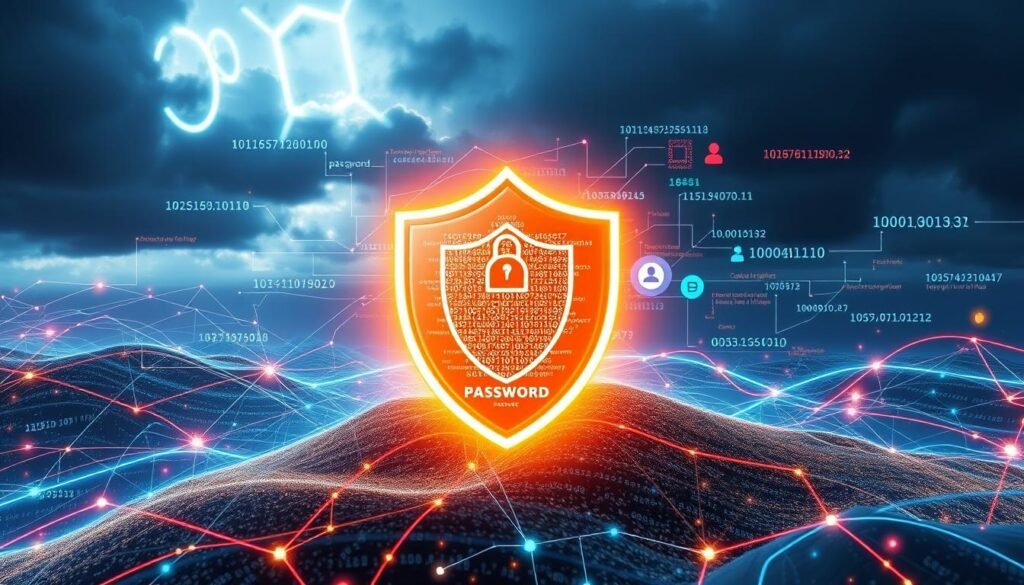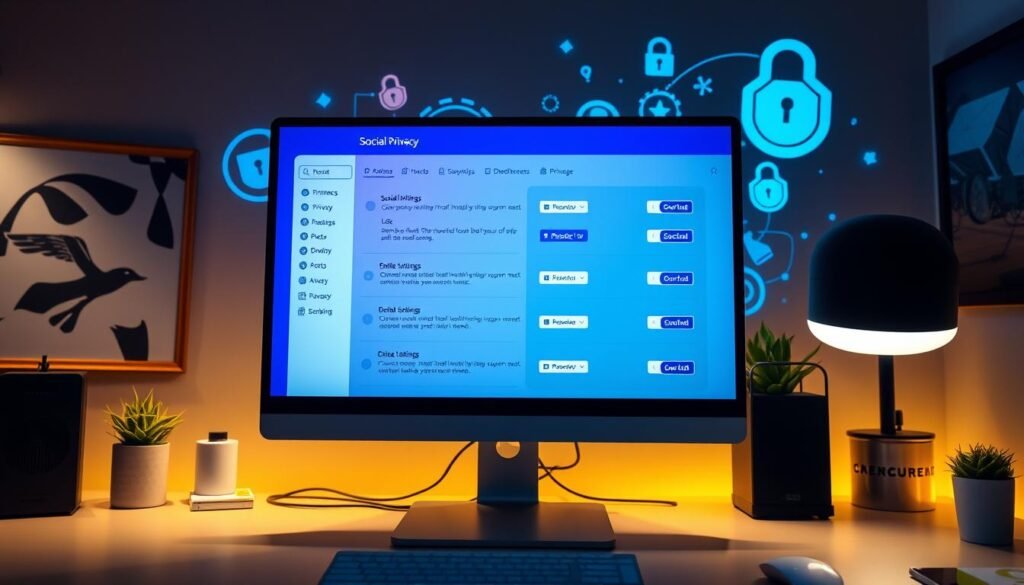Today, keeping our digital lives secure is more important than ever. With many stories about online privacy risks, Olivia Hack’s story stands out. It teaches us a lot. We learn how to protect our digital identity from her experiences. This article talks about the steps we should take to stay safe online.
Key Takeaways
- Understanding the critical nature of digital security.
- Learning from past incidents, like Olivia Hack’s situation.
- Adopting strong passwords for better protection.
- Implementing two-factor authentication for an extra layer of security.
- Fostering awareness against phishing attempts and scams.
- Regularly updating privacy settings on social media.
- Knowing the steps to take if a digital breach occurs.
Understanding the Importance of Digital Security
In our online world, digital security is more important than ever. As we use the internet for almost everything, our risk of data breach grows. This can lead to stolen identities, lost money, and a lot of stress.
Staying safe online is key. Cyberattacks can happen any time. Knowing about these dangers is the best defense. By learning how cybercriminals work, we can better protect ourselves.
Businesses also suffer from digital threats. They can face legal issues, lose customers’ trust, and lose money. This is true for all companies, even small ones. They’re often hit because their security isn’t as tight.
Keeping safe online matters for everyone. Knowing the risks and how to avoid them keeps our information safe. It’s something we all need to do.
Lessons from the Olivia Hack Incident
The Olivia Hack incident reminds us how vulnerable celebrities are in this digital age. Such privacy invasions often get lots of media attention. They show how quickly personal details can spread.
Keeping personal info safe is a big lesson here. Celebrities might think their data is safe, but breaches can happen when least expected. Everyone should be careful about what details they share online.
Being careful with who you interact with online is another key lesson. This incident shows the risks of being too interested in celebrity lives. It’s important to know what to share online to avoid misuse of your info.
To explain better, here’s a table with major lessons from the Olivia Hack case, with advice for everyone:
| Lesson from Incident | Everyday Recommendation |
|---|---|
| Protecting Personal Information | Be selective with the details you share on social media. |
| Vigilance in Online Interactions | Verify the credibility of users before engaging. |
| Awareness of Digital Rights | Educate yourself about your privacy rights. |
By learning from the Olivia Hack incident, you can better protect your personal info online. Recognizing potential privacy issues of celebrities helps too. Being aware and cautious creates a safer online space for all.
Protecting Your Personal Information Online
To keep your personal info safe online, it’s key to take steps early on. Knowing how to make strong passwords and using two-factor authentication is basic. These methods build up your security online.
Creating Strong Passwords
Strong passwords are crucial for your personal data’s safety. A good password mixes letters, numbers, and symbols. This combo keeps unwanted users out. Here’s how to make a strong password:
- Use at least 12 characters.
- Incorporate both uppercase and lowercase letters.
- Include numbers and symbols (e.g., !, @, #).
- Avoid using easily guessable information, such as birthdays or common words.
- Change passwords regularly to minimize vulnerability.

Utilizing Two-Factor Authentication
Two-factor authentication adds a crucial security layer. It asks for a password and another ID form like a code. This greatly lowers hacking risks. Many big services, like Google and Facebook, provide it. This shows its role in keeping information safe.
There are real stories that show why this extra step is needed. Many hacking cases happen because accounts didn’t have two-factor authentication. By pairing it with strong passwords, you greatly improve your security.
Olivia Hack: Securing Your Cloud Storage
In our digital world, cloud storage is a must for both work and personal stuff. The Olivia Hack situation showed us how crucial cloud storage security is. It’s key for people to act and safeguard their sensitive info from prying eyes.
Adding encryption services is a critical first step. With encryption, even if someone unauthorized gets in, your data stays safe. Services like Google Drive and Dropbox already encrypt your data. Plus, it’s good to regularly check who can see your files. Sharing them only with people you trust helps keep your data safe.
It’s also smart to understand your cloud service’s terms. This helps you know how they’ll handle your data. Some have better security than others. This knowledge helps you make wise choices on where to keep your data safe.
Below is a table to help you compare some cloud services and their security options:
| Service | Encryption | Two-Factor Authentication | Privacy Policy |
|---|---|---|---|
| Google Drive | End-to-end encryption | Available | Clear and comprehensive |
| Dropbox | Encrypted at rest and in transit | Available | User data privacy emphasized |
| OneDrive | Encrypted during upload and download | Available | Aligned with privacy laws |
To learn from Olivia Hack’s story, security must be our top priority. By picking the right steps and being cautious, we can protect our data much better. For more on staying safe in the digital world, try this podcast segment.
Recognizing Phishing Attempts and Scams
Today’s digital world is full of phishing threats. It’s key to know how these scams work to stay safe online. Being able to spot scams is vital. It keeps you from falling into traps like identity theft and fraud. There are several signs that can tip you off to phishing emails. These signs help you act fast and safeguard your personal info.
Common Signs of Phishing Emails
Always be careful when checking your email. Watch for these warning signs:
- Suspicious email addresses: Odd variations in the sender’s address might seem strange compared to what you know.
- Poor grammar and spelling: Phishing emails often have clear typos or sound off.
- Urgent requests: Emails that push you to act quickly, like confirming your info, are suspect.
- Misleading links: Move your mouse over links to check them before clicking. They could lead to harmful sites.
- Generic greetings: Phishers usually start with vague hellos, such as “Dear User,” instead of your actual name.
How to Report Phishing Scams
If you run into a phishing scam, don’t worry. Just follow these steps to report it:
- Forward the fishy email to the Anti-Phishing Working Group at reportphishing@apwg.org.
- Tell your email service about the scam. They can help stop these senders.
- Contact the company or group the scammer is pretending to be. This lets them warn others.
- If you clicked a link or shared info, change your passwords right away. Keep an eye on your accounts, too.
Taking action against scams and phishing helps keep the internet safer for everyone. Staying aware and cautious is the strongest shield we have against these ongoing dangers.
Managing Privacy Settings on Social Media
In today’s world, keeping your online space safe is super important. The key to staying safe online is managing your social media privacy settings. By doing so, you can choose who sees your stuff. This helps lower the risk of being contacted by strangers.
Social media sites give you lots of online privacy management options. You should pay attention to a few important things. These include:
- Adjust your profile visibility: Make your profile private to control who sees your posts and info.
- Limit friend requests: Accept friends or known people only, to avoid unwanted messages.
- Review app permissions: Frequently check what third-party apps can access your account.
When thinking about sharing safely, be mindful of what you post. Sharing things like where you are, your phone number, or what you do daily can be risky. Always think twice whether sharing something is truly needed or could invite trouble.
Using these privacy tools wisely means you can still have fun on social media while keeping your info safe. Take charge of your privacy today. Don’t leave it to luck.

Best Practices for Sharing Information
Engaging on social media safely means being thoughtful. Knowing social media etiquette is crucial for keeping your privacy. Before posting, think about who should see your updates. This helps avoid sharing too much and facing risks.
Controlling Who Sees Your Posts
Most social media platforms have tools to pick who sees your content. By controlling your audience, you protect your info and improve your online experience. Here’s how to enhance your privacy:
- Use audience controls to limit visibility to friends or specific groups.
- Avoid broadcasting sensitive information, like your location, live.
- Regularly review your privacy settings to match your current needs.
- Be cautious with public posts that might draw unwanted attention.
By following these practices, you can share safely and maintain a respectful online space. Taking time to manage who sees your posts not only keeps you safe but also supports good social media manners.
Dealing with a Digital Breach
Having a digital breach happen is scary. Acting quickly is key to manage it well. Knowing the right steps helps prevent further harm and secures your digital presence. Here’s what to do if this happens to you.
Steps to Take After a Breach
If you think there’s been a breach, act fast. Start by making your accounts safe with these actions:
- Change passwords for all affected accounts.
- Enable two-factor authentication (2FA) where possible.
- Notify financial institutions about any suspicious activity.
- Monitor your accounts closely for unusual transactions.
How to Recover from Identity Theft
Healing from identity theft takes effort and patience. To fight identity theft, follow these critical steps:
- Report the incident to local authorities and provide them with relevant documentation.
- Notify credit bureaus to place a fraud alert on your reports.
- Obtain and review your credit reports for discrepancies.
- Work with recovery services if needed to rebuild your credit.
There are many resources available to help. Taking action early helps in dealing with the effects of a breach confidently. Protecting yourself and recovering from any loss is easier with the right support.
Conclusion
It’s vital to secure your digital life in today’s tech-savvy world. We’ve looked at lessons from the Olivia Hack incident. It shows steps to protect ourselves online. This includes spotting phishing and adjusting privacy settings on social media. We have many strategies to use.
It’s crucial to put these safety measures into practice. By doing so, you can make your online life safer. This keeps your personal info secure. An informed and proactive approach is key. Take time to check your digital footprint and update as needed.
This should serve as a wake-up call to beef up your online safety. Olivia Hack’s experiences teach us that privacy is important for everyone online. For more on Olivia Hack, check out her official profile. Let’s make digital security a top priority!